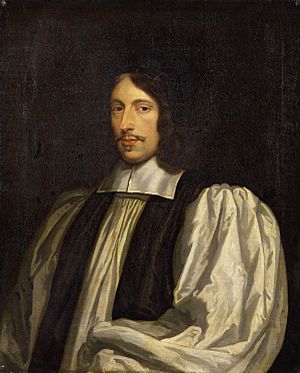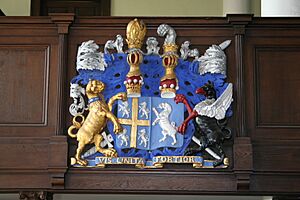Nathaniel Crew, 3rd Baron Crew facts for kids
Quick facts for kids The Right Reverend and Right Honourable The Lord Crew |
|
|---|---|
| Bishop of Durham | |

Oil painting of Crew as Bishop of Durham.
|
|
| Diocese | Diocese of Durham |
| In Office | 1674–1721 (death) |
| Predecessor | John Cosin |
| Successor | William Talbot |
| Other posts | Dean of Chichester (1669–1671) Clerk of the Closet (1669–1688) Bishop of Oxford (1671–1674) Dean of the Chapel Royal (1685–1688) |
| Orders | |
| Ordination | Lent 1665 (deacon & priest) |
| Consecration | 1671 |
| Personal details | |
| Born | 31 January 1633 Steane, Northamptonshire, England |
| Died | 18 September 1721 (aged 88) Steane, Northamptonshire, Great Britain |
| Buried | Steane Park, Northamptonshire |
| Nationality | English (later British) |
| Denomination | Anglican |
| Residence | Steane Park, Northamptonshire (inherited) Newbold Verdon, Leicestershire (inherited) |
| Parents | John Crew, 1st Baron Crew & Jemima (née Waldegrave) |
| Spouse | 1. Penelope (m. 1691–1699) 2. Dorothy (m. 1700–1715) |
| Alma mater | Lincoln College, Oxford |
Nathaniel Crew, the 3rd Baron Crew (born January 31, 1633 – died September 18, 1721), was an important leader in the Church of England. He served as the Bishop of Oxford from 1671 to 1674. After that, he became the Bishop of Durham and held this position for a very long time, from 1674 until his death in 1721. This made him one of the longest-serving bishops in the Church of England's history.
Nathaniel Crew came from a well-known family. His father was John Crew, the 1st Baron Crew. His grandfather, Thomas Crewe, was the Speaker of the House of Commons.
Contents
Early Life and Career
Nathaniel Crew studied at Lincoln College, Oxford. In 1665, he became both a deacon and a priest on the same day. A few years later, in 1668, he became the leader (Rector) of Lincoln College.
His career moved very quickly. In 1669, he became the Dean of Chichester Cathedral. Soon after, he was appointed Clerk of the Closet to King Charles II. This was an important role, and he kept it until 1688.
Becoming a Bishop
Crew was chosen to be the Bishop of Oxford in 1671. Just three years later, in 1674, he became the Bishop of Durham. He rose through the church ranks so fast because he had the support of the Duke of York, who later became King James II. Crew was close to the Duke and even baptized the Duke's daughter, Princess Catherine, in 1675.
In 1676, he became a Privy Counsellor. This meant he was a trusted advisor to the King. He was present at a key meeting in 1678 when a man named Titus Oates claimed to have uncovered a big plot against the King, known as the Popish Plot. This plot was later found to be false.
Changes in Power
When James II became King, Crew was also made the Dean of the Chapel Royal in 1685. He was part of a special church group in 1686. This group suspended Henry Compton, who was the Bishop of London. Crew then helped manage the London church area.
As King James's power weakened, Crew wisely changed his support. He voted for a motion that said King James had given up his throne. This helped him gain favor with the new government of William III. Even though he faced some difficulties in 1690, he was allowed to keep his important role as bishop.
Bishop of Durham's Work
During his time as Bishop of Durham, Nathaniel Crew helped create the first two new church areas (parishes) in England since the Reformation. These new parishes were in Stockton-on-Tees (in 1712) and Sunderland.
The church built in Sunderland, called the Church of the Holy Trinity, became very important. It helped establish local government in the growing port town. This was the first time Sunderland had proper local leadership since its earlier local government was stopped during the English Civil War.
Later Life and Family
From 1681 to 1688, Crew lived in London. He passed away in 1721. He was married twice. His first wife was Penelope Frowde, whom he married in 1691. After she died in 1699, he married Dorothy Forster in 1700. Dorothy passed away in 1715.
In 1697, Crew became the 3rd Baron Crew after his brother Thomas died. However, he did not have any children. Because of this, the title of Baron Crew ended when he died.
Legacy and Contributions
Nathaniel Crew left a lot of his wealth to help others. He gave large amounts of money to Lincoln College, Oxford and Oxford University. His generosity is still remembered today with an annual speech called the Creweian Oration.
His name also lives on in The Lord Crewe Arms Hotel in Blanchland. Crew bought the village in 1708 and helped rebuild its community. After his death in 1721, the village became part of his trust, which still owns the land today.
Crew also furnished the chapel at Steane Park, Northamptonshire. He owned this estate, having inherited it with his title.
Some historians used to criticize Crew, but now his contributions are better understood. Samuel Pepys, a famous diarist, thought highly of him. Pepys praised Crew's calm and proper way of preaching:
Dr. Crew did make a very pretty, neat, sober, honest sermon; and delivered it very readily, decently, and gravely, beyond his years: so as I was exceedingly taken with it, and I believe the whole chappell, he being but young; but his manner of his delivery I do like exceedingly.
Titles and Styles
Nathaniel Crew had several different titles throughout his life:
- 1633–1661: Nathaniel Crew Esq.
- 1661–1665: The Honourable Nathaniel Crew
- 1665–1669: The Reverend and Honourable Nathaniel Crew
- 1669–1671: The Very Reverend and Honourable Nathaniel Crew
- 1671–1676: The Right Reverend and Honourable Nathaniel Crew
- 1676–1697: The Right Reverend and Right Honourable Nathaniel Crew
- 1697–1721: The Right Reverend and Right Honourable Lord Crew PC
 | Aaron Henry |
 | T. R. M. Howard |
 | Jesse Jackson |


